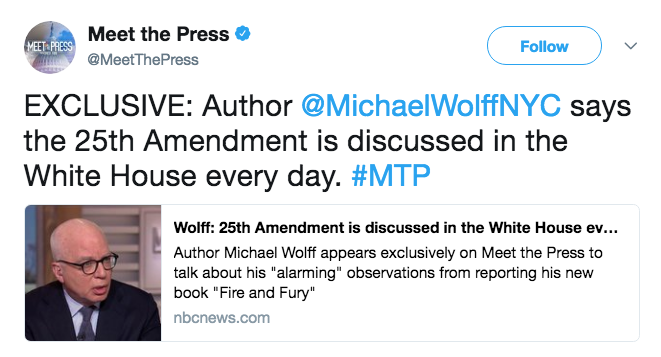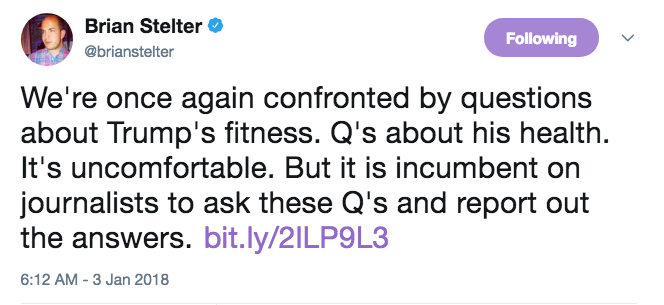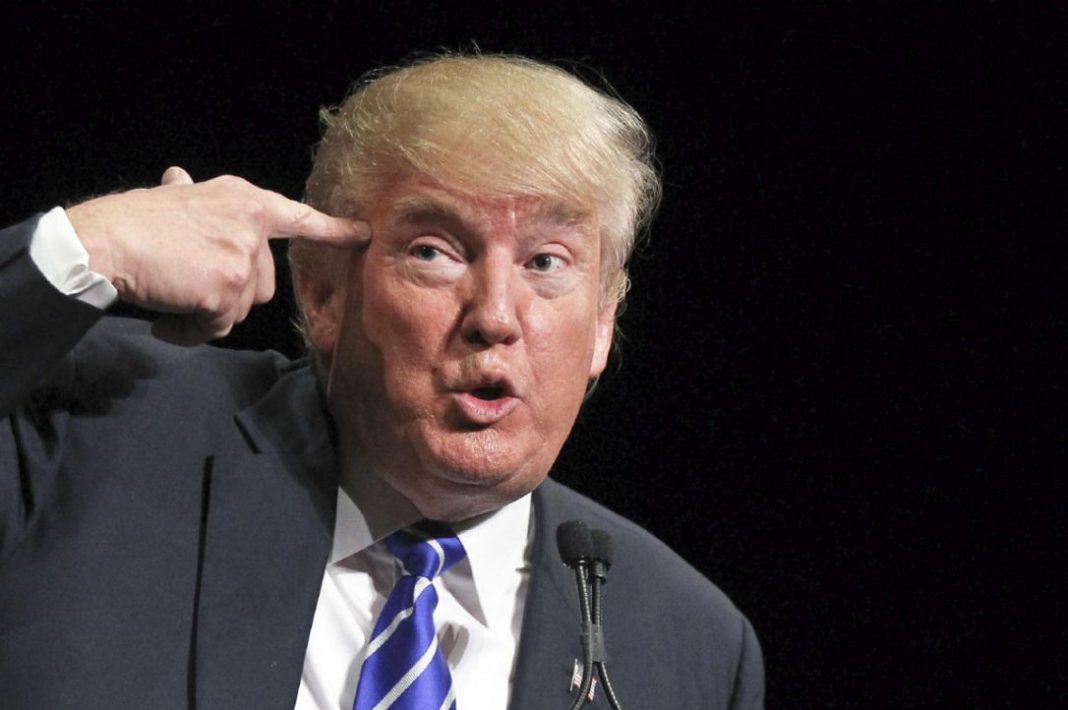In the second season of the TV show “24,” President David Palmer (Dennis Haysbert) is removed from office for failing to launch a war against three Middle East countries purportedly behind a nuclear attack on U.S. soil.
Palmer has reason to doubt his intelligence agencies’ assurances of who was behind it, and it turns out the attack was orchestrated by a cabal of business and military leaders who want to launch a war for personal gain. The means by which Palmer is removed from office during the 4:00-5:00a hour on Day 2 is the 25th Amendment to the U.S. Constitution, a portion of which reads:
Section 4. Whenever the Vice President and a majority of either the principal officers of the executive departments or of such other body as Congress may by law provide… to the Senate and the…House of Representatives their written declaration that the President is unable to discharge the powers and duties of his office, the Vice President shall immediately assume the powers and duties of the office as Acting President.
Palmer’s chief of staff explains, “it seems there are people, cabinet members, who question whether you’re fit to continue as chief executive.” The conniving vice president says in the cabinet meeting putting the president on trial, “What I intend to show is a pattern of erratic behavior since this crisis started.” Using half-true innuendos and rumors as well as deliberately false information, he convinces enough of the cabinet to depose Palmer. In other words, Palmer is the victim of a bloodless coup.
Now, “24” was so over the top that its dramatic twists became something of a punch line. How preposterous to imagine that a president’s handpicked cabinet would vote to oust him in a palace overthrow! But that fantasy land is precisely what some of the mostly unelected opposition hopes to see happen with President Trump as part of the more-than-a-year-long temper tantrum against the results of the 2016 election.
In the last debate of 2016, Fox News host Chris Wallace asked Trump if he would accept the election results, and he said “I will tell you at the time.” Hillary Clinton responded to Trump by calling his remark “horrifying.” The general media environment was to react with unabashed horror for at least 72 hours.
Trump’s comments were wrong — undermining confidence in the electoral process is unbecoming of a political leader of this great nation. But it’s doubtful that even Trump would have done a tiny fraction what his unelected opposition has done to undermine and overturn the results of the election had he lost. Even if he had thrown a year-long temper tantrum, he would not have been aided and abetted in it by a majority of the media or other members of the establishment.
Since his surprise win, the country has been subjected to attempts to delegitimize Trump’s election by blaming “fake news” for tricking voters into supporting him, or a year-long obsession, still noticeably unsubstantiated, with the idea that he conspired with Russians to steal the election from Hillary Clinton. We’ve heard people desperately attempt to keep the Electoral College from voting for him, been told that damaging information from intelligence agencies would keep him from being inaugurated, and that the cabinet should pull a “24”-style move and oust him via the 25th Amendment.
Among those struggling to accept the fact that the American people elected Donald Trump in 2016, the 25th Amendment has been a go-to fantasy for a while, particularly among those who strongly dislike Trump’s less-interventionist foreign policy. Eliot Cohen reached for it in the very first week of the presidency.
Washington Post columnist Kathleen Parker waited until February 10 to say that the cabinet should use that amendment’s provisions since Trump is “so incompetent — or not-quite-right” that he poses a threat. Perhaps most famously, New York Times‘ conservative columnist Ross Douthat went hard for the 25th Amendment solution to what ails him in mid-May.
We’re coming in on the close of an unexpectedly successful first year for Trump, despite the media’s Sturm und Drang against the presidency, Trump’s lack of political allies, and his political naïveté. Trump’s year ended with corporate tax reform passed for the first time in decades. Individual tax rates were cut for the vast majority of Americans. Regulations have been slashed. Trump changed direction on the Paris Climate Accord, on the Clean Power Plan, and the Iran nuclear deal. Foreign policy has been reoriented, with results including real success against ISIS. He appointed numerous judges to federal courts. Last week, the stock market topped 25,000 for the first time, despite the prediction of New York Times columnist Paul Krugman that the stock market would “never” recover from Trump’s election. It was also the week that Michael Wolff’s gossipy if less-than-true book came out about the early chaotic days of the Trump White House, and the talk of mental unfitness — and accompanying fantasies about ousters — reached ever-new heights.
Wolff was transparent about his desire to raise this point as he went around to media outlets asserting “the story that I have told seems to present this presidency in such a way that it says he can’t do his job” and his hope or belief that it “will end this presidency.” Even as various journalists and media outlets admitted the book was false, that it had made-up quotes and anecdotes, and that it didn’t grasp basics of the Trump White House, they said they believed it was fake, but accurate.
Despite the veracity problems, journalists used the book to ask any manner of guests about mental health concerns. “Meet The Press” pushed out Wolff’s undoubtedly false message about the 25th Amendment without a moment’s hesitation:

At the same time, media leaders of the movement to oust Trump used a book by an academic who has been ranting and raving about Trump and mental fitness for more than a year. She claimed to meet with Democrats and a Republican senator (it turned out she had embellished that last part) to discuss Trump’s fitness. This was used for segment after media segment discussing the same.
Politico got the ball rolling with “Washington’s growing obsession: The 25th Amendment.” The not entirely stable “Morning Joe” has been obsessed about a 25th Amendment removal for months, and here’s MSNBC’s Joe Scarborough tweeting outa New York Times article that quotes the academic who is trying to get Trump ousted. Here’s that New York Times article. It mentions a 25th-Amendment ouster five times. It being a day ending in -y, the Washington Post‘s Jennifer Rubin was talking about a coup.
CNN host Brian Stelter used to oppose questions about the health of politicians when the politician was named Hillary Clinton, but he’s been on a tear about Trump’s mental health since at least February, more so recently, making claims of not being comfortable slightly hard to buy:

The Yale psychiatrist everyone is promoting is quoted in a Vox interview saying people should “contain” Trump against his will, force him to undergo an evaluation, and have him declared unfit, adding “many lawyer groups have actually volunteered, on their own, to file for a court paper to ensure that the security staff will cooperate with us. But we have declined, since this will really look like a coup…”
Yes, removing a president by force tends to look like a coup. Nevertheless, CNN and other media outlets are mainstreaming this conspiracy plot. Here’s The Atlantic getting in on the action:

Trump is unlike any previous president of the United States. Voters knew this when they chose him over Hillary Clinton. And there is nothing about Trump now that suggests his mental state is any different or worse or dangerous than when voters elected him, or when they first encountered him on gossip pages and in reality television decades ago.
To suggest otherwise is to undermine the democratic election of presidents, and to do so would be far more damaging to the country than anything Trump’s actually done. It is particularly noteworthy that members of an elite are calling for his ouster when Trump’s election was partly in response to anger at mismanagement by members of the media and political establishment.
Talk of mental health and a 25th Amendment removal, “by force if necessary,” is talk of a coup, just as it was in the TV show “24.” Responsible parties should consider how this is perceived by the part of the electorate they rarely speak to and cease.





